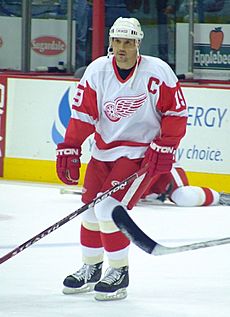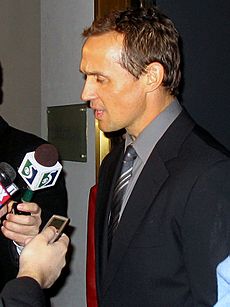Steve Yzerman facts for kids
Quick facts for kids Steve Yzerman |
|||||||||||||||||||||||||||||||||||||||||||
|---|---|---|---|---|---|---|---|---|---|---|---|---|---|---|---|---|---|---|---|---|---|---|---|---|---|---|---|---|---|---|---|---|---|---|---|---|---|---|---|---|---|---|---|
| Hockey Hall of Fame, 2009 | |||||||||||||||||||||||||||||||||||||||||||
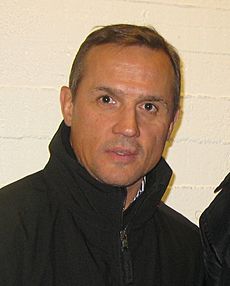
Yzerman in 2012
|
|||||||||||||||||||||||||||||||||||||||||||
| Born | May 9, 1965 Cranbrook, British Columbia, Canada |
||||||||||||||||||||||||||||||||||||||||||
| Height | 5 ft 11 in (180 cm) | ||||||||||||||||||||||||||||||||||||||||||
| Weight | 185 lb (84 kg; 13 st 3 lb) | ||||||||||||||||||||||||||||||||||||||||||
| Position | Centre | ||||||||||||||||||||||||||||||||||||||||||
| Shot | Right | ||||||||||||||||||||||||||||||||||||||||||
| Played for | Detroit Red Wings | ||||||||||||||||||||||||||||||||||||||||||
| National team | |||||||||||||||||||||||||||||||||||||||||||
| NHL Draft | 4th overall, 1983 Detroit Red Wings |
||||||||||||||||||||||||||||||||||||||||||
| Playing career | 1983–2006 | ||||||||||||||||||||||||||||||||||||||||||
|
Medal record
|
|||||||||||||||||||||||||||||||||||||||||||
Stephen Gregory Yzerman (pronounced EYE-zər-mən; born May 9, 1965) is a Canadian former professional ice hockey player. He is currently the executive vice president and general manager of the Detroit Red Wings. Yzerman played his entire 22-season NHL career with the Red Wings. Many people consider him one of the greatest hockey players ever. He is a famous sports figure in Detroit and a member of the Hockey Hall of Fame. After he stopped playing, he worked in the Red Wings' management. Later, he became the general manager for the Tampa Bay Lightning. He also led Team Canada as executive director in two Olympic Games.
Before the 1986–87 season, when he was 21, Yzerman became the captain of the Red Wings. He held this role for two decades, playing over 1,300 games as captain. This made him the longest-serving captain in North American major league sports history. People in Detroit often called him "Stevie Y," "Stevie Wonder," or "The Captain." Yzerman helped the Red Wings win five first-place finishes in the regular season. He also led them to three Stanley Cup championships in 1997, 1998, and 2002. He retired in 2006 as one of the NHL's top scorers. After playing, he continued his career in hockey management.
Yzerman earned many awards during his career. He won the Lester B. Pearson Award (most outstanding player) in the 1988–89 season. In 1998, he received the Conn Smythe Trophy as the most valuable player in the Stanley Cup playoffs. He also won the Frank J. Selke Trophy as the league's best defensive forward in 2000. In 2003, he received the Bill Masterton Memorial Trophy for his perseverance. Yzerman played in ten All-Star Games. He was a first team All-Star in 2000 and part of the NHL All-Rookie Team in 1984.
Yzerman also played for Team Canada in several international tournaments. In 2002, he won an Olympic gold medal. This made him one of the few players to win both an Olympic gold medal and the Stanley Cup in the same year. Yzerman was the general manager for Team Canada at the 2007 IIHF World Championship, which they won. He was named executive director for Team Canada for the 2010 Winter Olympics. Team Canada won the gold medal there, beating the United States. Yzerman was again executive director for the 2014 Winter Olympics. Canada won their second straight gold medal. He was inducted into the IIHF Hall of Fame in 2014.
Contents
Playing Career Highlights
Early Years with the Red Wings (1983–1986)
Yzerman was born in Cranbrook, British Columbia. He grew up mostly in Nepean, Ontario. As a young player, he played in the 1977 Quebec International Pee-Wee Hockey Tournament. He also played for his hometown Nepean Raiders Junior A team. After one season, the Peterborough Petes of the Ontario Hockey League (OHL) drafted him. He played centre for the Petes from 1981 to 1983.
The 1983 NHL Entry Draft was important for the Detroit Red Wings. The team's general manager, Jim Devellano, wanted to draft Pat LaFontaine. However, the New York Islanders picked LaFontaine third overall. So, Devellano chose Yzerman as the fourth pick. The Red Wings thought about sending Yzerman back to junior hockey. But after just one training camp session, they knew he was ready for the NHL. Yzerman scored 39 goals and 87 points in his first season. He finished second in voting for the Calder Memorial Trophy, which goes to the best rookie. That season, Yzerman also became the youngest player (18 years, 267 days) to play in an NHL All-Star Game. This record stood for 27 years.
Becoming a Star Player (1986–1996)
After captain Danny Gare left in the 1985–86 season, coach Jacques Demers named Yzerman captain. This happened on October 7, 1986. Yzerman became the youngest captain in the team's history. Demers said he wanted a player who truly loved the Red Wings. In the next season, Yzerman scored his 50th goal on March 1, 1988. However, he injured his knee in the same game and missed the rest of the season. Even without him, the Red Wings won their first division title in 23 years.
During the 1988–89 season, Yzerman had an amazing year. He recorded 155 points, with 65 goals and 90 assists. He finished third in regular season scoring, behind only Mario Lemieux and Wayne Gretzky. He won the Lester B. Pearson Award, voted by the players as the MVP. He was also a finalist for the Hart Memorial Trophy, voted by hockey writers.
When Scotty Bowman became head coach in 1993, Yzerman found his coaching style tough at first. Bowman believed Yzerman needed to focus more on defense. He expected his forwards to be good at back-checking. Their relationship was so difficult that the Red Wings even thought about trading Yzerman. But Yzerman worked hard and became a much better defensive player. He is now considered one of the best two-way forwards in hockey history.
In 1995, Yzerman led Detroit to their first Stanley Cup Finals appearance since 1966. However, the Red Wings lost to the New Jersey Devils in a sweep. The next season, Detroit set an NHL record with 62 regular season wins. They were expected to win the Stanley Cup. Yzerman scored a famous goal in the 1996 playoffs. He stole the puck from Wayne Gretzky and scored from the blue line. This goal won Game 7 of the Western Conference Semifinals in double overtime against the St. Louis Blues. But the Red Wings lost to the Colorado Avalanche in the Western Conference Finals.
Winning Stanley Cups (1996–2002)
In 1997, Yzerman proved he could lead a team to a championship. Detroit won its first Stanley Cup in 42 years, sweeping the Philadelphia Flyers. The next year, Detroit won again, sweeping the Washington Capitals for their second straight Cup. Yzerman won the Conn Smythe Trophy as the playoff MVP. He famously handed the Cup first to Vladimir Konstantinov. Konstantinov had been badly injured in a car accident just after the 1997 victory.
On November 26, 1999, Yzerman became the 11th player in NHL history to score 600 goals. In 2000, he was named to the NHL All-Star first team. He also won the Frank J. Selke Trophy as the league's best defensive forward.
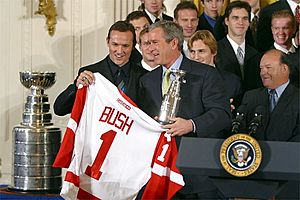
In 2001–02, Yzerman's knee injury got worse. He missed 30 regular season games. His knee caused him great pain during the 2002 playoffs. But he still led the Red Wings. They came back from a 2–0 deficit against the Vancouver Canucks. They also beat the St. Louis Blues. Then they faced Colorado for the Western Conference Championship. Detroit defeated Colorado in a seven-game series. They then moved on to the Stanley Cup Finals. There, they beat the Carolina Hurricanes to win their tenth Stanley Cup. Instead of raising the Cup first, Yzerman passed it to coach Scotty Bowman, who retired after the game.
Final Seasons (2003–2006)
During the offseason, Yzerman had knee surgery. He missed the first 61 games of the 2002–03 season. He returned on February 24, 2003. After the season, Yzerman won the Bill Masterton Memorial Trophy for his perseverance.
On May 1, 2004, Yzerman was hit in the eye by a deflected shot in a playoff game. This broke a bone around his eye and scratched his eye. Yzerman had eye surgery and missed the rest of the 2004 playoffs. The eye injury also kept him from playing in the 2004 World Cup of Hockey. Other players, like Joe Thornton and Joe Sakic, refused to wear Yzerman's number 19 for Team Canada out of respect for him. Yzerman returned in the 2005–06 season after the NHL lockout. He wore a visor to protect his eye.
On August 2, 2005, Yzerman signed his last contract as a player with the Red Wings. On March 31, 2006, he scored his 691st NHL goal. This moved him past Mario Lemieux for eighth place all-time. Yzerman was humble about it, saying it showed how good Lemieux was since he played fewer years. He scored his final NHL goal, his 692nd, on April 3, 2006. Yzerman played his last professional game on May 1, 2006. The Red Wings lost to the Edmonton Oilers in Game 6 of the first round of the 2006 playoffs, ending their season.
Retirement and Legacy
On July 3, 2006, Yzerman announced his retirement from the NHL. He finished his career as the sixth all-time leading scorer in NHL history. His career high was 155 points in 1988–89. Only Wayne Gretzky and Mario Lemieux have scored more points in a single season. Yzerman's number 19 jersey was retired on January 2, 2007. This happened during a ceremony at Joe Louis Arena in Detroit. On November 4, 2008, he was inducted into Canada's Sports Hall of Fame. He also became a member of the Hockey Hall of Fame in 2009. His former Red Wings teammates Brett Hull and Luc Robitaille were inducted with him. In 2017, Yzerman was named one of the "100 Greatest NHL Players" in history.
Yzerman holds the NHL record for the longest-serving captain of a single team. He wore the "C" for 19 seasons and 1,303 games. He ranks high in NHL history for goals, assists, and total points. In Red Wings history, he is second only to Gordie Howe in most offensive categories. He has more assists than Howe. At the time of his retirement, only Howe and Alex Delvecchio had played more games as a Red Wing. He is now fourth in games played for the team, behind Howe, Delvecchio, and Nicklas Lidström. Lidström was his teammate for his final 12 seasons.
Managerial Career
Detroit Red Wings Management
On September 25, 2006, the Red Wings named Yzerman team vice-president. He won a fourth Stanley Cup championship as an executive in 2007–08. In May 2010, he left the Red Wings to become general manager of the Tampa Bay Lightning. He held that role until September 2018. On April 19, 2019, Yzerman returned to the Red Wings as their general manager.
On January 2, 2007, the Red Wings retired Yzerman's jersey #19. As an extra honor, a captain's "C" was added to his banner. This was to remember him as "The Captain." The ceremony was hosted by his friend, former NHL goaltender Darren Pang. Many Red Wings legends like Gordie Howe and Scotty Bowman were there. Active Red Wings players wore special Yzerman jerseys for the ceremony. Former teammate Vladimir Konstantinov also attended, walking across the ice for the first time without a wheelchair since his accident.

On January 2, 2007, Yzerman received the key to the city of Detroit from Mayor Kwame Kilpatrick. On January 13, 2007, Michigan Governor Jennifer Granholm declared it "Steve Yzerman Day" in Michigan.
On January 11, 2008, Yzerman was inducted into the Ottawa Sports Hall of Fame. He was also inducted into the Michigan Sports Hall of Fame on February 11, 2008. On June 23, 2009, it was announced that Yzerman would be inducted into the Hockey Hall of Fame.
Yzerman had wanted to run a team since the later part of his playing career. He gained experience working with Hockey Canada. However, the Red Wings' general manager Ken Holland and assistant general manager Jim Nill received contract extensions. This meant Yzerman would not get the general manager job there at that time.
Tampa Bay Lightning General Manager
After Ken Holland's contract extension, Jeffrey Vinik, the new owner of the Tampa Bay Lightning, wanted to hire Yzerman. Yzerman accepted the Lightning job. He was named the team's new vice-president and general manager on May 25, 2010. In his first offseason, he made important moves. He re-signed Martin St. Louis and signed other key players. He also traded for goaltender Dwayne Roloson. The Lightning reached the Eastern Conference Finals just one year after missing the playoffs. Yzerman was nominated for the NHL General Manager of the Year Award.
Even though the Lightning missed the playoffs for the next two seasons, Yzerman drafted many future star players. These included Nikita Kucherov, Andrei Vasilevskiy, and Brayden Point. He also signed undrafted players like Tyler Johnson. He acquired other important players through trades. The team reached the Stanley Cup Finals in 2015, but lost to the Chicago Blackhawks. On June 24, 2015, Yzerman won the NHL General Manager of the Year Award. He was the first Lightning general manager to receive this honor. The team he built set franchise records with 50 wins and 108 points that season.
In the 2017–18 season, the Lightning finished first in their division. They made it to the Eastern Conference Finals before losing. On September 11, 2018, Yzerman announced he would not re-sign as general manager. He stayed with the team as a senior advisor. His assistant, Julien BriseBois, took over as general manager.
Return to Detroit Management
On April 19, 2019, the Red Wings announced that Yzerman was hired as their general manager. The previous general manager, Ken Holland, was promoted. Holland later left to become general manager of the Edmonton Oilers.
Leading Team Canada
On January 30, 2007, Hockey Canada named Yzerman the general manager of Team Canada. This was for the 2007 IIHF World Championship in Moscow. The team beat Finland 4–2 on May 13 to win the Championship.
On October 18, 2008, Yzerman was named executive director for the Canadian men's hockey team. This was for the 2010 Winter Olympics. The Canadian team he put together won the gold medal. This was the first gold won by a home team in ice hockey since 1980. Yzerman said he would consider returning to lead the Canadian team in 2014. He enjoyed the role, even though it was stressful.
In 2012, Yzerman was again named executive director for the Canadian men's hockey team. This was for the 2014 Winter Olympics. The Canadian team won their second straight gold medal. This was the first time Canada had done this since 1948 and 1952. After Canada's 3–0 victory over Sweden in the gold medal game, Yzerman announced he would not return for the 2018 Winter Olympics.
International Play for Canada
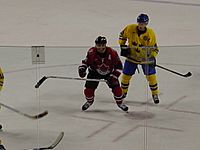
Yzerman played for Canada in several major tournaments:
- 1983 World Junior Ice Hockey Championships
- 1984 Canada Cup
- 1985 Ice Hockey World Championships
- 1989 Ice Hockey World Championships
- 1990 World Ice Hockey Championships
- 1996 World Cup of Hockey
- 1998 Winter Olympics
- 2002 Winter Olympics
In 1998, Yzerman was a top choice for captain of Team Canada. Other candidates included Wayne Gretzky and Ray Bourque. Yzerman had just led the Red Wings to a Stanley Cup. However, general manager Bobby Clarke chose Eric Lindros as captain.
In late 2005, Yzerman decided not to play in a third Olympics. Wayne Gretzky then announced that no one would wear jersey #19 for Canada in the 2006 Olympics. This was to honor Yzerman. (Yzerman later allowed #19 to be worn again when he managed Team Canada for the 2010 Olympics).
Personal Life
Yzerman and his wife Lisa Brennan have three daughters. They live in Bloomfield Hills, Michigan. Yzerman also lived in Hillsborough County, Florida, when he worked for the Lightning. He has become a naturalized United States' citizen because he has lived in Michigan for many years.
Yzerman was born in Cranbrook, B.C., but grew up mostly in Nepean, Ontario. In 1997, the Nepean Sportsplex named one of its indoor ice rinks the Steve Yzerman Arena in his honor. This is the home rink for the CCHL's Nepean Raiders. Yzerman played for the Raiders in the 1980–81 season. The CCHL divisions are named the Robinson and Yzerman Divisions after famous alumni.
Career Statistics Summary
| Regular season | Playoffs | |||||||||||||
|---|---|---|---|---|---|---|---|---|---|---|---|---|---|---|
| Season | Team | League | GP | G | A | Pts | PIM | GP | G | A | Pts | PIM | ||
| 1980–81 | Nepean Raiders | CJHL | 50 | 38 | 54 | 92 | 44 | — | — | — | — | — | ||
| 1981–82 | Peterborough Petes | OHL | 58 | 21 | 43 | 64 | 65 | 6 | 0 | 1 | 1 | 16 | ||
| 1982–83 | Peterborough Petes | OHL | 56 | 42 | 49 | 91 | 65 | 4 | 1 | 4 | 5 | 0 | ||
| 1983–84 | Detroit Red Wings | NHL | 80 | 39 | 48 | 87 | 33 | 4 | 3 | 3 | 6 | 0 | ||
| 1984–85 | Detroit Red Wings | NHL | 80 | 30 | 59 | 89 | 58 | 3 | 2 | 1 | 3 | 2 | ||
| 1985–86 | Detroit Red Wings | NHL | 51 | 14 | 28 | 42 | 16 | — | — | — | — | — | ||
| 1986–87 | Detroit Red Wings | NHL | 80 | 31 | 59 | 90 | 43 | 16 | 5 | 13 | 18 | 8 | ||
| 1987–88 | Detroit Red Wings | NHL | 64 | 50 | 52 | 102 | 44 | 3 | 1 | 3 | 4 | 6 | ||
| 1988–89 | Detroit Red Wings | NHL | 80 | 65 | 90 | 155 | 61 | 6 | 5 | 5 | 10 | 2 | ||
| 1989–90 | Detroit Red Wings | NHL | 79 | 62 | 65 | 127 | 79 | — | — | — | — | — | ||
| 1990–91 | Detroit Red Wings | NHL | 80 | 51 | 57 | 108 | 34 | 7 | 3 | 3 | 6 | 4 | ||
| 1991–92 | Detroit Red Wings | NHL | 79 | 45 | 58 | 103 | 64 | 11 | 3 | 5 | 8 | 12 | ||
| 1992–93 | Detroit Red Wings | NHL | 84 | 58 | 79 | 137 | 44 | 7 | 4 | 3 | 7 | 4 | ||
| 1993–94 | Detroit Red Wings | NHL | 58 | 24 | 58 | 82 | 36 | 3 | 1 | 3 | 4 | 0 | ||
| 1994–95 | Detroit Red Wings | NHL | 47 | 12 | 26 | 38 | 40 | 15 | 4 | 8 | 12 | 0 | ||
| 1995–96 | Detroit Red Wings | NHL | 80 | 36 | 59 | 95 | 64 | 18 | 8 | 12 | 20 | 4 | ||
| 1996–97 | Detroit Red Wings | NHL | 81 | 22 | 63 | 85 | 78 | 20 | 7 | 6 | 13 | 4 | ||
| 1997–98 | Detroit Red Wings | NHL | 75 | 24 | 45 | 69 | 46 | 22 | 6 | 18 | 24 | 22 | ||
| 1998–99 | Detroit Red Wings | NHL | 80 | 29 | 45 | 74 | 42 | 10 | 9 | 4 | 13 | 0 | ||
| 1999–00 | Detroit Red Wings | NHL | 78 | 35 | 44 | 79 | 34 | 8 | 0 | 4 | 4 | 0 | ||
| 2000–01 | Detroit Red Wings | NHL | 54 | 18 | 34 | 52 | 18 | 1 | 0 | 0 | 0 | 0 | ||
| 2001–02 | Detroit Red Wings | NHL | 52 | 13 | 35 | 48 | 18 | 23 | 6 | 17 | 23 | 10 | ||
| 2002–03 | Detroit Red Wings | NHL | 16 | 2 | 6 | 8 | 8 | 4 | 0 | 1 | 1 | 2 | ||
| 2003–04 | Detroit Red Wings | NHL | 75 | 18 | 33 | 51 | 46 | 11 | 3 | 2 | 5 | 0 | ||
| 2005–06 | Detroit Red Wings | NHL | 61 | 14 | 20 | 34 | 18 | 4 | 0 | 4 | 4 | 4 | ||
| NHL totals | 1,514 | 692 | 1,063 | 1,755 | 924 | 196 | 70 | 115 | 185 | 84 | ||||
International Play Statistics
| Year | Team | Event | GP | G | A | Pts | PIM | |
|---|---|---|---|---|---|---|---|---|
| 1983 | Canada | WJC | 7 | 2 | 3 | 5 | 2 | |
| 1984 | Canada | CC | 4 | 0 | 0 | 0 | 0 | |
| 1985 | Canada | WC | 10 | 3 | 4 | 7 | 6 | |
| 1989 | Canada | WC | 8 | 5 | 7 | 12 | 2 | |
| 1990 | Canada | WC | 10 | 9 | 10 | 19 | 8 | |
| 1996 | Canada | WCH | 6 | 2 | 1 | 3 | 0 | |
| 1998 | Canada | OLY | 6 | 1 | 1 | 2 | 10 | |
| 2002 | Canada | OLY | 6 | 2 | 4 | 6 | 2 | |
| Junior totals | 7 | 2 | 3 | 5 | 2 | |||
| Senior totals | 50 | 22 | 27 | 49 | 28 | |||
Awards and Achievements
- NHL All-Star Game Roster – 1984 (first 18-year old selected), 1988, 1989, 1990, 1991, 1992, 1993, 1997, 1999, 2000
- NHL first team All-Star – 2000
- Lester B. Pearson Award – 1989
- Conn Smythe Trophy – 1998
- Frank J. Selke Trophy – 2000
- Stanley Cup champion (as player) – 1997, 1998, 2002
- Stanley Cup champion (as executive) – 2008
- Bill Masterton Memorial Trophy – 2003
- Lester Patrick Trophy – 2006
- Seventh in NHL history in points, tenth in goals, and ninth in assists
- First in Red Wings history in assists; second in points and goals; fourth in games played
- Longest-serving captain for a team in league history (19 seasons, 1,303 games)
- Number (19) retired with Canadian Men's National Team (later worn by Joe Thornton in 2010 Olympics)
- Named vice-president of Detroit Red Wings – 2006
- Detroit Red Wings #19 retired on January 2, 2007
- Named general manager of Team Canada – 2008
- Ranked sixth in The Hockey News "The Top 60 Since 1967 – The Best Players of the Post Expansion Era"
- Inducted into Ottawa Sports Hall of Fame – January 11, 2008
- Inducted into the Michigan Sports Hall of Fame – February 11, 2008
- Inducted into Canada's Sports Hall of Fame – 2008
- Inducted into the Hockey Hall of Fame – 2009
- Named general manager and vice-president of the Tampa Bay Lightning – May 2010
- Inducted into the IIHF Hall of Fame – 2014
- Named to the Order of Hockey in Canada by Hockey Canada – 2014
- NHL General Manager of the Year Award – 2015
- Named on the 100 Greatest NHL Players list for the NHL's Centennial Anniversary – 2017
- Named general manager and executive vice-president of the Detroit Red Wings – April 2019
See also
 In Spanish: Steve Yzerman para niños
In Spanish: Steve Yzerman para niños
- List of NHL statistical leaders
- Captain (ice hockey)
- List of NHL players with 1,000 points
- List of NHL players with 500 goals
- List of NHL players with 1,000 games played
- List of NHL players who spent their entire career with one franchise
 | Janet Taylor Pickett |
 | Synthia Saint James |
 | Howardena Pindell |
 | Faith Ringgold |


